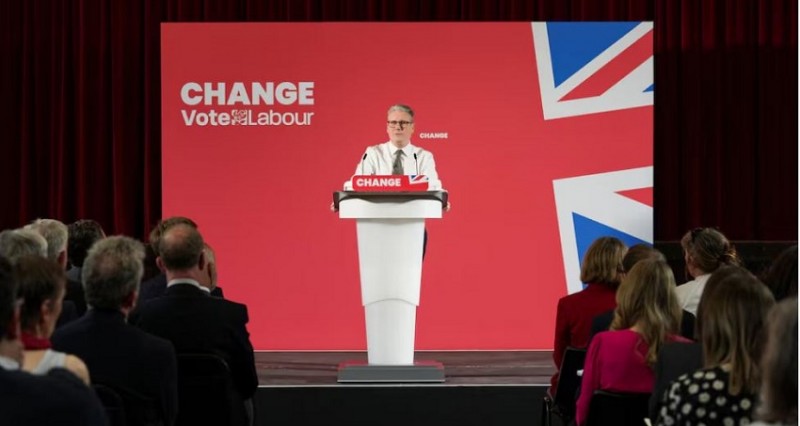
In the race for Britain's next Prime Minister, Keir Starmer emerges as a compelling contender. A former human rights lawyer turned state prosecutor, his journey embodies resilience and determination, poised to lead the nation with a blend of pragmatism and ambition.
At 61, Starmer, bearing the name of Labour's founding father Keir Hardie, brings a working-class ethos to the forefront of UK politics, a departure from the stereotypical portrayal of a London elite. Raised by a toolmaker father and a nurse mother, his upbringing roots him firmly in the realities of everyday life, a fact he often emphasizes to voters.
With his signature grey quiff and black-rimmed glasses, Starmer presents a unique figure in British politics, capturing the curiosity of many. Despite occasional criticisms of being uninspiring, his supporters hail him as a dedicated pragmatist, drawing parallels between his legal career and his approach to governance.
Starmer's journey to political prominence bears the marks of personal challenges and professional achievements. Raised in a modest household on the outskirts of London, he navigated a childhood marked by familial responsibilities and a passion for music. His legal career saw him championing radical causes before assuming prominent roles within the justice system.
Though sometimes appearing uneasy in the public eye, the dedicated Arsenal football fan, who entered politics later in life, has struggled to shake off an image of being overly formal and dull. Yet, in private, the married father-of-two is known to be humorous and loyal, and his journey to the brink of premiership is more compelling than often recognized.
Early Life and Career
Born on September 2, 1962, Keir Rodney Starmer grew up in a modest, semi-detached house near London, with a seriously ill mother and a distant father. He had three siblings, one with learning difficulties, and his parents were passionate about rescuing animals.
Starmer, a talented musician, took violin lessons with Norman Cook, who later became DJ Fatboy Slim, and attended a prestigious music school in London on weekends. After studying law at the universities of Leeds and Oxford, he focused on radical causes, defending trade unions, anti-McDonald's activists, and death row inmates abroad. He formed a friendship with human rights lawyer Amal Clooney and even shared a memorable, boozy lunch with her and her husband, actor George Clooney.
In 2003, Starmer took a surprising turn towards the establishment by taking a job to ensure police in Northern Ireland complied with human rights laws. In 2008, he became the director of public prosecutions for England and Wales, overseeing significant cases including MP expense abuses, phone-hacking journalists, and the prosecution of young rioters in 2011.
Knighted by Queen Elizabeth II, Starmer rarely uses the title "Sir." In 2015, he was elected as an MP for a left-leaning north London seat, shortly before his mother passed away from a rare joint disease that had immobilized her for many years.
Political Journey and Leadership
In 2021, Starmer broke down in a TV interview, describing how his mother's painful death deeply affected his father. Just a year after becoming an MP, Starmer challenged Labour leader Jeremy Corbyn over his handling of the EU referendum campaign but rejoined the leadership team later as Labour's Brexit spokesman, eventually succeeding Corbyn in April 2020.
Starmer has demonstrated his decisive nature by expelling Corbyn from the party, steering it back to the center, and tackling anti-Semitism issues that had damaged Labour's reputation. Although he has been criticized for abandoning several campaign promises, such as scrapping university tuition fees, his strategic repositioning of Labour aims to restore its path to power, driven by his lifelong ambition to succeed.
"If you're born without privilege, you don't have time for messing around," Starmer once said. "You don't walk around problems without fixing them, and you don't surrender to the instincts of organizations that won't face up to change."
ReadMore: